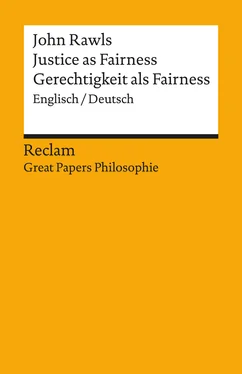Furthermore, it follows from the concept of morality that, to the extent that the slaveholder recognizes his position vis-a-vis the slave to be unjust, he would not choose to press his claims. His not wanting to receive his special advantages is one of the ways in which he shows that he thinks slavery is unjust. It would be fallacious for the legislator to suppose, then, that it is a ground for having a practice that it brings advantages greater than disadvantages, if those for whom the practice is designed, and to whom the advantages flow, acknowledge that they have no moral title to them and do not wish to receive them.
For these reasons the principles of justice have a special weight; and with respect to the principle of the greatest satisfaction of desire, as cited in the general position amongst those discussing the merits of their common practices, the principles of justice have an absolute weight. In this sense they are not contingent; and this is why their force is greater than can be accounted for by the general presumption [98](assuming that there is one) of the [191] effectiveness, in the utilitarian sense, of practices which in fact satisfy them.
If one wants to continue using the concepts of classical utilitarianism, one will have to say, to meet this criticism, that at least the individual or social utility functions must be so defined that no value is given to the satisfaction of interests the representative claims of which violate the principles of justice. In this way it is no doubt possible to include these principles within the form of the utilitarian conception; but to do so is, of course, to change its inspiration altogether as a moral conception. For it is to incorporate within it principles which cannot be understood on the basis of a higher order executive decision aiming at the greatest satisfaction of desire.
It is worth remarking, perhaps, that this criticism of utilitarianism does not depend on whether or not the two assumptions, that of individuals having similar utility functions and that of diminishing marginal utility, are interpreted as psychological propositions to be supported or refuted by experience, or as moral and political principles expressed in a somewhat technical language. There are, certainly, several advantages in taking them in the latter fashion.21 For one thing, one might say that this is what [100]Bentham and others really meant by them, as least as shown by how they were used in arguments for social reform. More importantly, one could hold that the best way to defend the classical utilitarian view is to interpret these assumptions as moral and political principles. It is doubtful whether, taken as psychological propositions, they are true of men in general as we know them under normal conditions. On the other hand, utilitarians would not have wanted to propose them merely as practical working principles of legislation, or as expedient maxims to guide reform, given the egalitarian sentiments of modern society.22 [192] When pressed they might well have invoked the idea of a more or less equal capacity of men in relevant respects if given an equal chance in a just society. But if the argument above regarding slavery is correct, then granting these assumptions as moral and political principles makes no difference. To view individuals as equally fruitful lines for the allocation of benefits, even as a matter of moral principle, still leaves the [102]mistaken notion that the satisfaction of desire has value in itself irrespective of the relations between persons as members of a common practice, and irrespective of the claims upon one another which the satisfaction of interests represents. To see the error of this idea one must give up the conception of justice as an executive decision altogether and refer to the notion of justice as fairness: that participants in a common practice be regarded as having an original and equal liberty and that their common practices be considered unjust unless they accord with principles which persons so circumstanced and related could freely acknowledge before one another, and so could accept as fair. Once the emphasis is put upon the concept of the mutual recognition of principles by participants in a common practice the rules of which are to define their several relations and give form to their claims on one another, then it is clear that the granting of a claim the principle of which could not be acknowledged by each in the general position (that is, in the position in which the parties propose and acknowledge principles before one another) is not a reason for adopting a practice. Viewed in this way, the background of the claim is seen to exclude it from consideration; that it can represent a value in itself arises from the conception of individuals as separate lines for the assignment of benefits, as isolated persons who stand as claimants on an administrative or benevolent largesse. Occasionally persons do so stand to one [104]another; but this is not the general case, nor, more importantly, is it the case when it is a matter of the justice of practices themselves in which participants stand in various relations to be appraised in accordance with standards which they may be expected to acknowledge before one another. Thus however mistaken the notion of the social contract may be as history, and however far it may overreach itself as a general theory of social and [193] political obligation, it does express, suitably interpreted, an essential part of the concept of justice.23
8. By way of conclusion I should like to make two remarks: first, the original modification of the utilitarian principle (that it require of practices that the offices and positions defined by them be equal unless it is reasonable to suppose that the representative man in every office would find the [106]inequality to his advantage), slight as it may appear at first sight, actually has a different conception of justice standing behind it. I have tried to show how this is so by developing the concept of justice as fairness and by indicating how this notion involves the mutual acceptance, from a general position, of the principles on which a practice is founded, and how this in turn requires the exclusion from consideration of claims violating the principles of justice. Thus the slight alteration of principle reveals another family of notions, another way of looking at the concept of justice.
Second, I should like to remark also that I have been dealing with the concept of justice. I have tried to set out the kinds of principles upon which judgments concerning the justice of practices may be said to stand. The analysis will be successful to the degree that it expresses the principles involved in these judgments when made by competent persons upon deliberation and reflection.24 Now every [108]people may be supposed to have the [194] concept of justice, since in the life of every society there must be at least some relations in which the parties consider themselves to be circumstanced and related as the concept of justice as fairness requires. Societies will differ from one another not in having or in failing to have this notion but in the range of cases to which they apply it and in the emphasis which they give to it as compared with other moral concepts.
A firm grasp of the concept of justice itself is necessary if these variations, and the reasons for them, are to be understood. No study of the development of moral ideas and of the differences between them is more sound than the analysis of the fundamental moral concepts upon which it must depend. I have tried, therefore, to give an analysis of the concept of justice which should apply generally, however [110]large a part the concept may have in a given morality, and which can be used in explaining the course of men’s thoughts about justice and its relations to other moral concepts. How it is to be used for this purpose is a large topic which I cannot, of course, take up here. I mention it only to emphasize that I have been dealing with the concept of justice itself and to indicate what use I consider such an analysis to have.
Читать дальше












